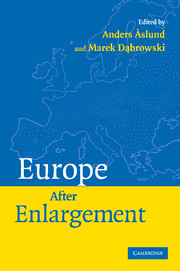Book contents
- Frontmatter
- Contents
- List of Charts, Tables, and Boxes
- Contributors
- Acknowledgments
- Introduction
- 1 Has Europe Lost Its Heart?
- 2 Economic Implications of the Social Provisions of the Stalled EU Constitution
- 3 Fiscal Policy and Fiscal Rules in the European Union
- 4 Design and Implementation of the Stability and Growth Pact: The Perspective of New Member States
- 5 Perspectives on the Lisbon Strategy: How to Increase European Competitiveness
- 6 Is Europe Reforming? Evidence from Cross-Country Structural Indicators
- 7 Recovery Growth as a Stage of Post-Socialist Transition
- 8 Comparative Oligarchy: Russia, Ukraine, and the United States
- 9 The Economic Rationale of the “European Neighbourhood Policy”
- 10 Economic Integration of Eurasia: Opportunities and Challenges of Global Significance
- Index
- References
9 - The Economic Rationale of the “European Neighbourhood Policy”
Published online by Cambridge University Press: 04 December 2009
- Frontmatter
- Contents
- List of Charts, Tables, and Boxes
- Contributors
- Acknowledgments
- Introduction
- 1 Has Europe Lost Its Heart?
- 2 Economic Implications of the Social Provisions of the Stalled EU Constitution
- 3 Fiscal Policy and Fiscal Rules in the European Union
- 4 Design and Implementation of the Stability and Growth Pact: The Perspective of New Member States
- 5 Perspectives on the Lisbon Strategy: How to Increase European Competitiveness
- 6 Is Europe Reforming? Evidence from Cross-Country Structural Indicators
- 7 Recovery Growth as a Stage of Post-Socialist Transition
- 8 Comparative Oligarchy: Russia, Ukraine, and the United States
- 9 The Economic Rationale of the “European Neighbourhood Policy”
- 10 Economic Integration of Eurasia: Opportunities and Challenges of Global Significance
- Index
- References
Summary
Introduction
The accession of ten new member states to the European Union on May 1, 2004, brought deep changes to Europe's political economy, both toward the new member states and the EU's “new neighbors” to the east and south. To formulate a policy toward these “new neighbors,” the European Commission (EC) presented the European Neighbourhood Policy (ENP) strategy paper, setting out a new framework for relations and financial support for the neighborhood countries in May 2004 (EC, 2004a). The neighbors in question were Ukraine, Belarus, Moldova, Algeria, Egypt, Israel, Jordan, Lebanon, Libya, Morocco, Syria, Tunisia, and the Palestinian Authority, with the recommendation to also include Armenia, Azerbaijan, and Georgia. Russia was included as a privileged partner. Then European Commission President Romano Prodi described the goal of the ENP as seeking to create a “ring of friends” around the EU, by offering close cooperation on issues ranging from political dialogue to economic integration. This initiative was supposed to allow these neighbors to participate in major EU policies and programs, and ultimately in the EU's single market. ENP participants were expected to form a relationship with the EU similar to that of the European Economic Area (EEA) members, such as Norway, Iceland, and Liechtenstein.
This chapter describes the general framework of the EU's emerging relationship with its new neighbors and explores the potential economic impact of the ENP, both for the EU itself and for its neighbors in the Commonwealth of Independent States (CIS): Armenia, Azerbaijan, Belarus, Georgia, Moldova, Russia, and Ukraine.
- Type
- Chapter
- Information
- Europe after Enlargement , pp. 165 - 188Publisher: Cambridge University PressPrint publication year: 2007
References
- 5
- Cited by

